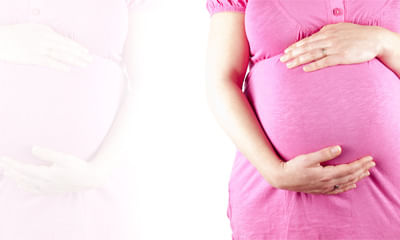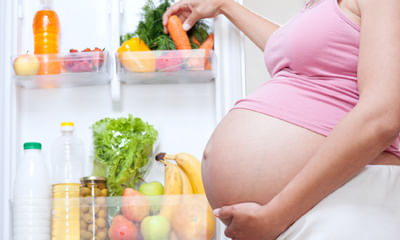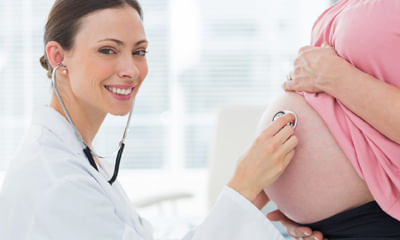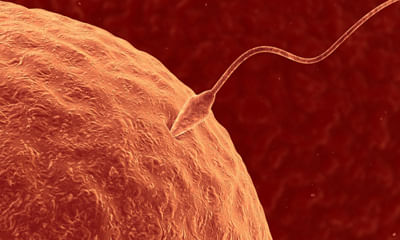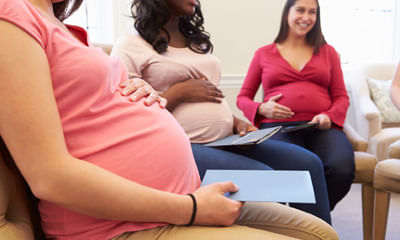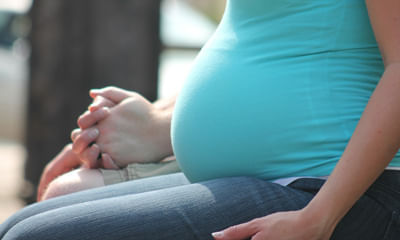Medicine For Premature Labor
Is betnesol injection safe during pregnancy in 8th month? Will it cause pre term delivery? Does it cause increase in neu ...
Ask Free Question
It is given to promote lung maturity of the baby and reduces problems of the baby if it is born prematurely. It does NOT cause preterm delivery or increase in neutrophil.
My wife is 36 weeks pregnant. Doctor has now given duvadilan retard once daily. He advised to take two doses of inj. bet ...
Ask Free Question
Betnesol is for fetal lung maturity.. So dat baby can breathe easily after coming out of womb.. U can wait after injection but only after ur gynecologist approval as she or he knows btr regarding ur condition and indication for c section... Cap duvadilon retard is for premature uterine contraction or pain...
I am 23 weeks pregnant. Its my 2nd pregnancy. Age of my previous child was 19 month. I delivered hin by c section. Yeste ...
Ask Free Question
Tab duvadilan can be safely taken during pregnancy. It's a tocolytic ,it's given during pregnancy if patient is having irritable uterus or premature labour pains ,or if patient has history of preterm delivery in the past or if the doctor on examination feels that patient may go into preterm labour
I am pregnant 4 months and twins. Is this possible for normal delivery. Can I feed both kids sufficient ly. I am ready t ...
Ask Free Question
Congratulations for your pregnancy. What you are asking about normal (Vaginal) delivery is something which can be decided only when you go in labor. With twin pregnancy there is a high risk of delivery before TERM (i.e 37 weeks ).In Twin pregnancy, at delivery, the situations can be different for the babies. The position of the babies at delivery determines whether they will deliver normally. Normal position of the baby means when baby is head down in your body. If the baby at the time of delivery is in any position other than this, then there are high chances of a cesarean. At times, after the vaginal delivery of the first baby, the second of twin moves and its position may change to an abnormal one. In such instances, cesarean may also be required for the second baby's birth. So considering all this it would be prudent to leave the decision to the attending gynecologist and and baby. Since premature delivery is a possibility, it would be better to register yourself with a hospital where care of premature babies is available 24/4 and operative delivery (Cesarean section) can be done anytime. In twin pregnancies, usually the babies are NOT very big, so taking adequate nutrition, rest and medicines will help them achieve the best possible growth to help themselves when they are born. Proteins are the building blocks of life, and hence protein rich food like daal, legumes, and meat milk etc can help supply these. Doing Yoga may make your body more flexible but IT does not guarantee normal delivery. So do it only if you like it and are not exhausted by it, that too under guidance from your doctor. Having a good nutritious diet will keep you fit to have a good care for self and baby. Take iron rich foods to maintain good hemoglobin, as there are chances of excess blood loss during twin pregnancy delivery. While having a bath, take care of your nipples, lightly hold them and pull them outwards to prevent retraction. Wishing you all the very best for a joyous pregnancy.
I am 37 weeks pregnant and my baby movements are less (5 to 6 movements in a day) from past few days, I have done with m ...
Ask Free Question
Nothing to worry, continue with medicines, ultrasound reports show cervix, the mouth of uterus is about 3 cm open. If it's a first baby, it's a good sign at 37 weeks, means mouth has started to open and soon you will be having labour pains and baby delivered at 37 weeks plus is not premature, weight is about 3 kg, head is in lower side with placenta up and not blocking the passage of baby. Reports favor you to have a normal delivery. Go to labour room with a relaxed mind, don't count the movement of baby about babies in womb do need to rest for about 20 hours plus unless you have taken some cough syrups, they can cause sedation in baby too. Do share the good news with all of us here. Be careful if it's a second baby, mouth of uterus is opening up and go to hospital as soon as possible, when labour pains start as compared to 1st normal delivery second delivery takes lesser time.
Main 36 years women hun. Mari shadi ko 7 years ho chuke hain. Mari first delivery 2010 main hui thi. Us waqt mara baby p ...
Ask Free Question
Hi dear, the reason for white discharge can be your vaginal or cervical infection. You have to first get thorough check up and treatment for the same before you conceive because ongoing infection if present, can go up in uterus and again lead to preterm labour. All the best.
Please Tell me what is do and not do in the pregnancy's first 3 month and which diet is taken in these months. ...
Ask Free Question
The first trimester of your pregnancy is the most important phase. During this phase your body undergoes various physiological and psychological changes and your baby’s major organ developments also happen simultaneously. You need to exercise certain precautions during the first trimester to avoid any serious health complications. What you do during the initial three months defines the health and wellness of your baby and that of yours too. Here are things that you should do during this trimester to ensure a smooth ride ahead. Things to do during your first trimester: • Get your required number of calories from all food groups, not just fat! Include variety of foods in the diet like whole grains, pulses, legumes and nuts. Meat, poultry, eggs and fish also provide protein. Make sure you get your calcium from milk or other food. Take 600 ml of milk or milk products every day for the calcium content. Eating during pregnancy • Get your dose of vitamin D through food like egg yolks, tuna, salmon, fortified milk, fish liver oil, or through exposure to sunlight. • Increase your intake of omega-3 fatty acids. They are necessary for the development of your baby’s brain, nerve and eye. • Take iron and folic acid supplements as prescribed by your doctor. It is important during the pre-conception and early pregnancy phase because this is when the foetus develops spine and nerve cells. • Eat frequent, smaller meals. The baby needs to be fed constantly so eat every two to three hours. • Gain weight gradually. For the optimal growth of your baby you should gain around 0.5- 2 kg in the first trimester. Get some exercise. Regular gentle exercise can help ease or prevent back pain, boost your energy, build stamina and help you prepare for the physical changes of labour and delivery. • Don’t miss your visits to the doctor. Your prenatal check-ups are your window into the womb and they help detect any issues early and can be corrected in most cases. • Increase your fluid intake. Blood volume needs to increase during pregnancy to facilitate oxygen and nutrient delivery to both you and your baby. • Get lots of sleep. Hormonal changes also make you feel worn out. So make it a point to get few naps whenever possible. • Cut down on caffeine. Large amounts of caffeine consumption and an increased risk of miscarriage have been linked in some studies. Things to avoid on your first trimester • Don’t take any medication unless necessary. Medicines taken by you can cross the placenta and enter the bloodstream of your baby. Hence it’s best to know the safety of any medications you’re taking during pregnancy – especially in the first trimester. • Don’t be too adventurous with food. Foods to be avoided during pregnancy include raw/undercooked meat, soft cheese, seafood and raw eggs. They could be possible sources of harmful bacteria and parasite. Reduce your exposure to environmental pollutants. According to a study, women exposed to elevated levels of ozone air pollution (smog) in the first three months of pregnancy may be at increased risk for complications such as preeclampsia and premature birth. • Quit smoking. Passive and active smoking during pregnancy increases the risk of health and behavioural problems in the baby and is linked to infant mortality. • Don’t drink alcohol. Alcohol can cross the placenta and reach your baby’s bloodstream. Excessive drinking impairs the mental and physical development of your baby, in what is known as foetal alcohol syndrome. Don’t get stressed, depressed. High levels of stress can affect the unborn baby’s health and increase your chances of miscarriage. • Don’t go on diet while you’re pregnant. You may end up with deficiency of iron, folic acid, vitamins and minerals which can potentially harm you and your baby. • Don’t use hot tubs/ sauna. They can raise your core body temperature which can cause dehydration and threaten the developing baby.
I m a pregnant women so wht is the most important care for me please tell me as soon as possible. ...
Ask Free Question
The first trimester of your pregnancy is the most important phase. During this phase your body undergoes various physiological and psychological changes and your baby’s major organ developments also happen simultaneously. You need to exercise certain precautions during the first trimester to avoid any serious health complications. What you do during the initial three months defines the health and wellness of your baby and that of yours too. Here are things that you should do during this trimester to ensure a smooth ride ahead. Things to do during your first trimester: • Get your required number of calories from all food groups, not just fat! Include variety of foods in the diet like whole grains, pulses, legumes and nuts. Meat, poultry, eggs and fish also provide protein. Make sure you get your calcium from milk or other food. Take 600 ml of milk or milk products every day for the calcium content. Eating during pregnancy • Get your dose of vitamin D through food like egg yolks, tuna, salmon, fortified milk, fish liver oil, or through exposure to sunlight. • Increase your intake of omega-3 fatty acids. They are necessary for the development of your baby’s brain, nerve and eye. • Take iron and folic acid supplements as prescribed by your doctor. It is important during the pre-conception and early pregnancy phase because this is when the foetus develops spine and nerve cells. • Eat frequent, smaller meals. The baby needs to be fed constantly so eat every two to three hours. • Gain weight gradually. For the optimal growth of your baby you should gain around 0.5- 2 kg in the first trimester. Get some exercise. Regular gentle exercise can help ease or prevent back pain, boost your energy, build stamina and help you prepare for the physical changes of labour and delivery. • Don’t miss your visits to the doctor. Your prenatal check-ups are your window into the womb and they help detect any issues early and can be corrected in most cases. • Increase your fluid intake. Blood volume needs to increase during pregnancy to facilitate oxygen and nutrient delivery to both you and your baby. • Get lots of sleep. Hormonal changes also make you feel worn out. So make it a point to get few naps whenever possible. • Cut down on caffeine. Large amounts of caffeine consumption and an increased risk of miscarriage have been linked in some studies. Things to avoid on your first trimester • Don’t take any medication unless necessary. Medicines taken by you can cross the placenta and enter the bloodstream of your baby. Hence it’s best to know the safety of any medications you’re taking during pregnancy – especially in the first trimester. • Don’t be too adventurous with food. Foods to be avoided during pregnancy include raw/undercooked meat, soft cheese, seafood and raw eggs. They could be possible sources of harmful bacteria and parasite. Reduce your exposure to environmental pollutants. According to a study, women exposed to elevated levels of ozone air pollution (smog) in the first three months of pregnancy may be at increased risk for complications such as preeclampsia and premature birth. • Quit smoking. Passive and active smoking during pregnancy increases the risk of health and behavioural problems in the baby and is linked to infant mortality. • Don’t drink alcohol. Alcohol can cross the placenta and reach your baby’s bloodstream. Excessive drinking impairs the mental and physical development of your baby, in what is known as foetal alcohol syndrome. Don’t get stressed, depressed. High levels of stress can affect the unborn baby’s health and increase your chances of miscarriage. • Don’t go on diet while you’re pregnant. You may end up with deficiency of iron, folic acid, vitamins and minerals which can potentially harm you and your baby. • Don’t use hot tubs/ sauna. They can raise your core body temperature which can cause dehydration and threaten the developing baby.
If a woman is two months pregnant, then what should she not eat and how can she take care of her pregnancy and what shou ...
Ask Free Question
The first trimester of your pregnancy is the most important phase. During this phase your body undergoes various physiological and psychological changes and your baby’s major organ developments also happen simultaneously. You need to exercise certain precautions during the first trimester to avoid any serious health complications. What you do during the initial three months defines the health and wellness of your baby and that of yours too. Here are things that you should do during this trimester to ensure a smooth ride ahead. Things to do during your first trimester: • Get your required number of calories from all food groups, not just fat! Include variety of foods in the diet like whole grains, pulses, legumes and nuts. Meat, poultry, eggs and fish also provide protein. Make sure you get your calcium from milk or other food. Take 600 ml of milk or milk products every day for the calcium content. Eating during pregnancy • Get your dose of vitamin D through food like egg yolks, tuna, salmon, fortified milk, fish liver oil, or through exposure to sunlight. • Increase your intake of omega-3 fatty acids. They are necessary for the development of your baby’s brain, nerve and eye. • Take iron and folic acid supplements as prescribed by your doctor. It is important during the pre-conception and early pregnancy phase because this is when the foetus develops spine and nerve cells. • Eat frequent, smaller meals. The baby needs to be fed constantly so eat every two to three hours. • Gain weight gradually. For the optimal growth of your baby you should gain around 0.5- 2 kg in the first trimester. Get some exercise. Regular gentle exercise can help ease or prevent back pain, boost your energy, build stamina and help you prepare for the physical changes of labour and delivery. • Don’t miss your visits to the doctor. Your prenatal check-ups are your window into the womb and they help detect any issues early and can be corrected in most cases. • Increase your fluid intake. Blood volume needs to increase during pregnancy to facilitate oxygen and nutrient delivery to both you and your baby. • Get lots of sleep. Hormonal changes also make you feel worn out. So make it a point to get few naps whenever possible. • Cut down on caffeine. Large amounts of caffeine consumption and an increased risk of miscarriage have been linked in some studies. Things to avoid on your first trimester • Don’t take any medication unless necessary. Medicines taken by you can cross the placenta and enter the bloodstream of your baby. Hence it’s best to know the safety of any medications you’re taking during pregnancy – especially in the first trimester. • Don’t be too adventurous with food. Foods to be avoided during pregnancy include raw/undercooked meat, soft cheese, seafood and raw eggs. They could be possible sources of harmful bacteria and parasite. Reduce your exposure to environmental pollutants. According to a study, women exposed to elevated levels of ozone air pollution (smog) in the first three months of pregnancy may be at increased risk for complications such as preeclampsia and premature birth. • Quit smoking. Passive and active smoking during pregnancy increases the risk of health and behavioural problems in the baby and is linked to infant mortality. • Don’t drink alcohol. Alcohol can cross the placenta and reach your baby’s bloodstream. Excessive drinking impairs the mental and physical development of your baby, in what is known as foetal alcohol syndrome. Don’t get stressed, depressed. High levels of stress can affect the unborn baby’s health and increase your chances of miscarriage. • Don’t go on diet while you’re pregnant. You may end up with deficiency of iron, folic acid, vitamins and minerals which can potentially harm you and your baby. • Don’t use hot tubs/ sauna. They can raise your core body temperature which can cause dehydration and threaten the developing baby.
Hi I am having symptoms of pregnancy. I came to korea for one month so could not consult any doctor. I am having acidi ...
Ask Free Question
Acidity and nausea are common symptoms during first three months.You can anything you like. While travelling keep yourself well hydrated.

